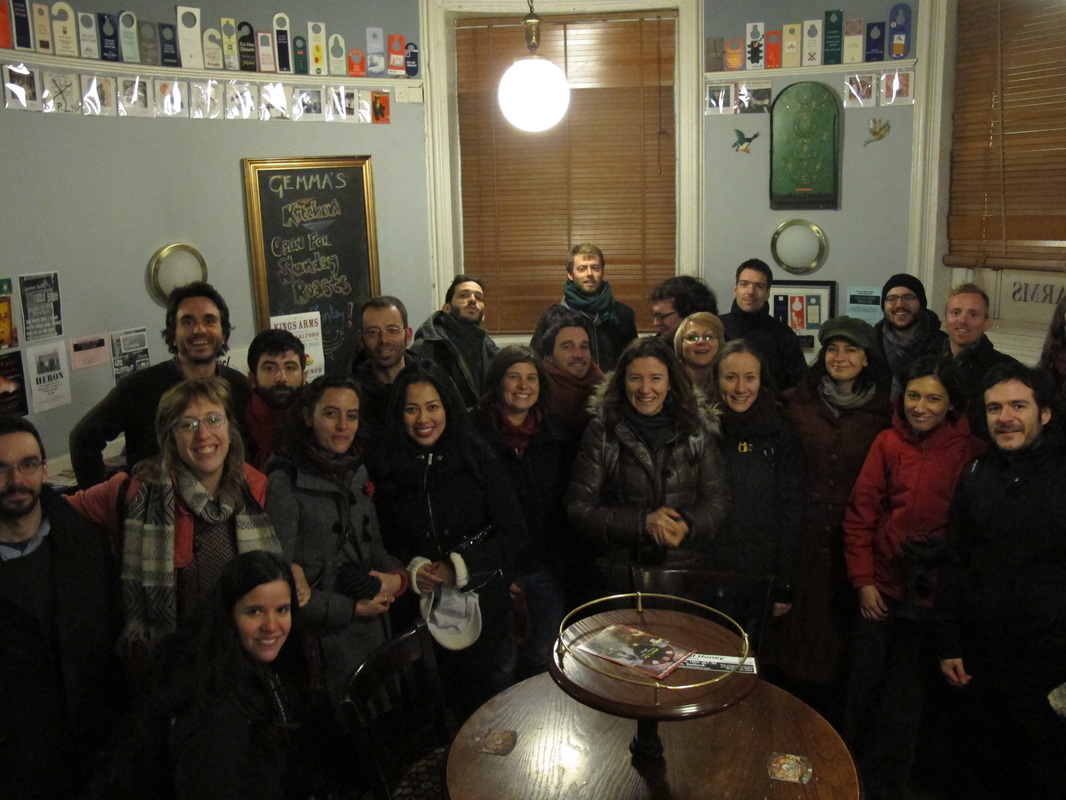The Human Geography department of the University of Manchester has been hosting around twenty PhD fellows from all over Europe. Politics is one of the themes so I was commissioned to do a Radical History tour of Manchester. The idea was to hang the tour off Friedrich Engels' time in Manchester and his association with Karl Marx.
The group were fabulous to take around, full of questions which challenged my knowledge, but for that reason made the tour more special and memorable. Thanks to the lady with the memorable name Julie de los Reyes (first row, left of centre above, with the white cuffs on her coat) for hiring me. Doesn't her name translate as Julie of the Kings? Wow.
It was a polyglot group although I was monoglot and guided just in English. There were Germans, French, Italians, Greeks, Spanish, Turkish, Chileans, Columbians - I lost count of the number of nationalities represented on the tour.
After meeting at the National Football Museum and visiting the Royal Exchange, we finished up at the Joseph Brotherton statue by the Irwell in Salford. I'd focussed on Engels, but brought in a range of other themes including anti-slavery Thomas Clarkson's visit to Manchester in 1787, the vegetarian movement, Free Trade and much else.
By Brotherton though we were all freezing. It was about minus two.
I suggested we finished off in the Kings Arms, just down the road.
One or two of the guests got excited the pub is owned by ex-House Martins/Beautiful South leader Paul Heaton. They also got excited by the beer and dived into the smorgasbord of English ales like people in a desert slating their thirst.
There were some interesting discussions after I'd finished presenting with various members of the group. One Greek fella was forthright about his country's problems and how public protest is necessary. His friend described how power in the country is divided between certain key families who crop up behind so much of Greek civic life.
My defence of the first-past-the-post system at General Elections surprised some of the guests but maybe they understood the point about the British system; that despite its failings it prevents extremist parties gaining any foothold in Parliament.
In a room of optimists, and thus left of centre with politics, we all agreed with the Engels' passage I concluded with from The Condition of the Working-Class in England (1844):
'When one individual inflicts bodily injury upon another, such injury that death results, we call the deed manslaughter; when the assailant knew in advance that the injury would be fatal, we call his deed murder.
'But when society places hundreds of proletarians in such a position that they inevitably meet a too early and an unnatural death, one which is quite as much a death by violence as that by the sword or bullet; when it deprives thousands of the necessaries of life, places them under conditions in which they cannot live—forces them, through the strong arm of the law, to remain in such conditions until that death ensues which is the inevitable consequence—knows that these thousands of victims must perish, and yet permits these conditions to remain, its deed is murder just as surely as the deed of the single individual; disguised, malicious murder, murder against which none can defend himself, which does not seem what it is, because no man sees the murderer, because the death of the victim seems a natural one, since the offence is more one of omission than of commission.
'But murder it remains.'
Astonishingly Engels was not even 25 years old when he wrote those words.

 RSS Feed
RSS Feed